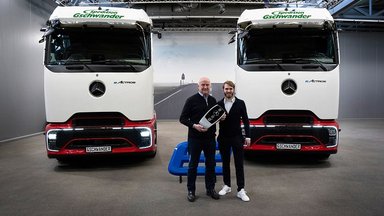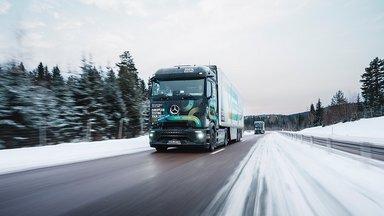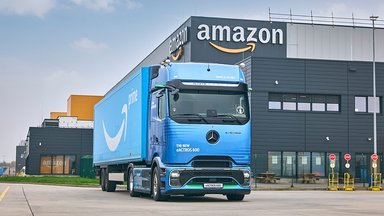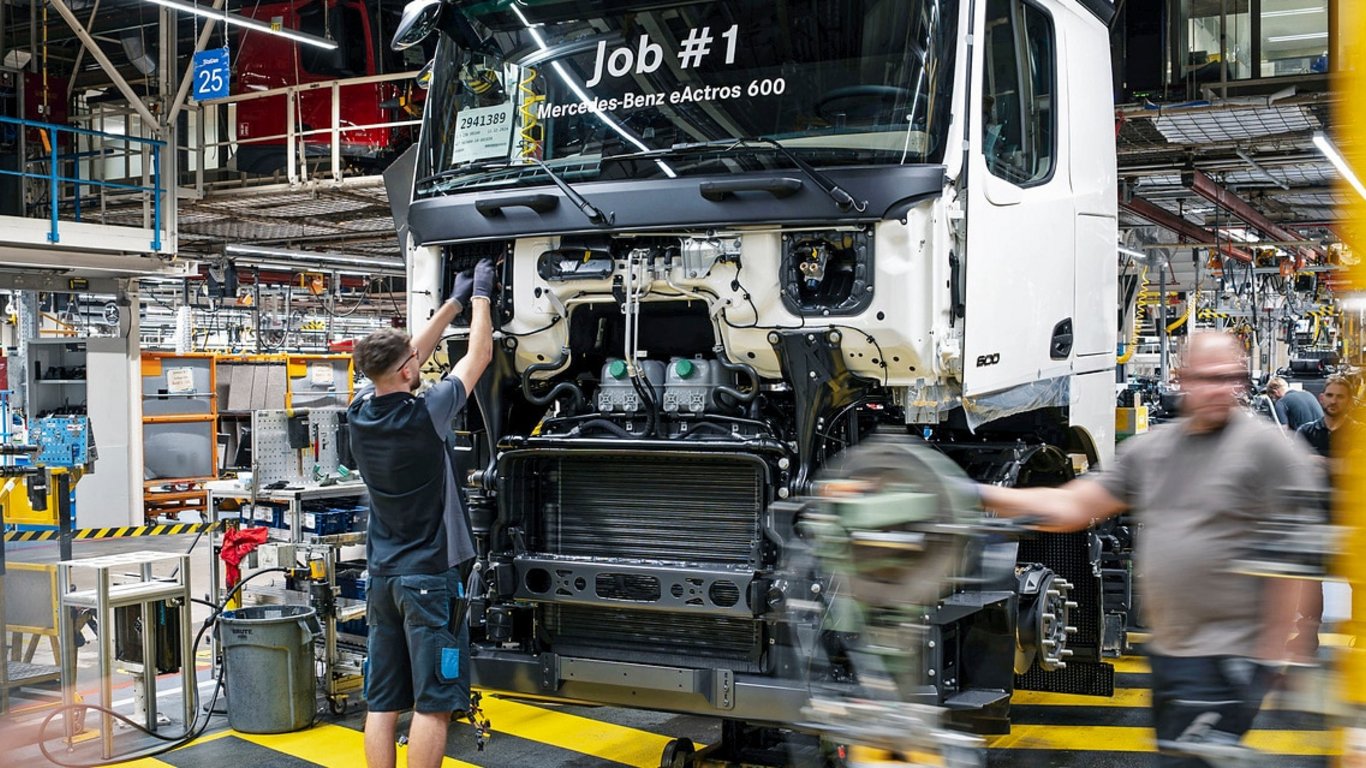
Daimler Truck celebrates series launch of the Mercedes-Benz eActros 600 for long-distance haulage in Wörth
Download
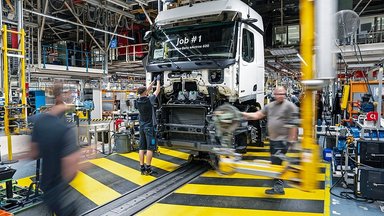
Daimler Truck celebrates series launch of the Mercedes-Benz eActros 600 for long-distance haulage in Wörth
Karin Rådström, CEO of Daimler Truck, and Daniela Schmitt, State Minister for Economics, Transport, Agriculture and Viticulture of the State of Rhineland-Palatinate, are kicking off series production of the new model. With the eActros 600, the third model of battery-electric trucks after the eActros 300/400 and the eEconic is already going into series production at the Mercedes-Benz plant in Wörth. It is the first electric…
- Karin Rådström, CEO of Daimler Truck, and Daniela Schmitt, State Minister for Economics, Transport, Agriculture and Viticulture of the State of Rhineland-Palatinate, are kicking off series production of the new model.
- With the eActros 600, the third model of battery-electric trucks after the eActros 300/400 and the eEconic is already going into series production at the Mercedes-Benz plant in Wörth.
- It is the first electric truck from Wörth where assembly takes place in one production hall.
- The component plants in Mannheim, Gaggenau and Kassel supply battery-electric drive components.
- Around 3,300 training sessions for employees at the Wörth site in 2023 alone on the new technologies of battery, high-voltage and hydrogen.
Wörth am Rhein – The electrification of the product range at Daimler Truck is progressing: The company today celebrated the series launch of the Mercedes-Benz eActros 600 for long-distance haulage at the Mercedes-Benz plant in Wörth. The start was made in the presence of Karin Rådström, CEO of Daimler Truck, and Daniela Schmitt, State Minister for Economics, Transport, Agriculture and Viticulture of the State of Rhineland-Palatinate as well as Jürgen Distl, Head of Mercedes-Benz Trucks Operations, Andreas Bachhofer, Head of the Wörth site and Production at Mercedes-Benz Trucks, and Michael Brecht, Chairman of the Group and General Works Council of Daimler Truck.
Karin Rådström, CEO of Daimler Truck: “The start of series production of our eActros 600 is a further proof of our ambition to transform the industry. With a range of 500 kilometers on a single battery charge, our eActros 600 is addressing the long-haul segment in Europe which is responsible for two-thirds of CO2 emissions from heavy road freight. Our battery-electric long-haul truck will therefore make a real difference.”
Daniela Schmitt, State Minister for Economics, Transport, Agriculture and Viticulture of the State of Rhineland-Palatinate: “With the series production of the eActros 600, Daimler Truck is once again proving that CO2-neutral freight transportation is already a reality today. In future, a vehicle will roll off the production line here in Wörth that will position itself at the forefront of technological development. For the second time in a week, this location is sending out a strong signal for the commercial vehicle industry. Together, we want to ensure that international competitiveness and industrial value creation in Rhineland-Palatinate are maintained in the future.”
Jürgen Distl, Head of Mercedes-Benz Trucks Operations: “As the lead plant in the production network of Mercedes-Benz Trucks, the Wörth site plays a central role, particularly with regard to the integration of battery-electric models such as the eActros 600. However, we are tackling the transformation at all levels of our production network—including in the area of CO2-neutral production and our own supply chain: We are already being supplied by electric trucks today, and the complete electrification of delivery traffic into the Wörth plant is scheduled to take place by the end of 2026—the eActros 600 will play a decisive role in this.”
Andreas Bachhofer, Head of the Wörth site and Production at Mercedes-Benz Trucks: “With the start of series production of the eActros 600, we are expanding our Wörth product portfolio with an important vehicle for the future. Construction of this first battery-electric truck made in Wörth will be fully integrated into the existing assembly hall, flexibly alongside the manufacturing of combustion-engine trucks. This means that we are ideally positioned for the production of larger quantities. Our production team is well prepared for the successive ramp-up over the coming months.”
Thomas Zwick, Chairman of the Works Council of the Wörth plant: “The eActros 600 is a further step in the implementation of the future contract that we on the Works Council agreed with the plant management in 2021. The fundamental decision to build all trucks here in Wörth, regardless of the drive type, secures jobs at the site and in the region. In addition, emission-free trucks with electric or fuel cell drives will create sustainable and attractive jobs with new tasks.”
Flexible production of the Mercedes-Benz eActros 600 in Wörth
The eActros 600 will be manufactured on the existing assembly line of the Wörth A-series production, in parallel with and flexibly alongside the trucks that will receive a diesel drive. The eActros 600 also receives all electrical components in this production hall. The entire system is commissioned at the end of the assembly line: From then on, the truck is ready to drive and lastly undergoes the finishing process and final inspection like all other trucks.
The eActros 600 is thus the first electric truck from Wörth where assembly takes place in one production hall. The conversion of the assembly lines as well as the integration of the eActros 600 into line production has taken place gradually. The previous eActros 300/400 and eEconic electric truck models leave the production hall for the assembly of the electric drive components in order to be electrified at the Future Truck Center in Wörth.
The Daimler Truck plants in Mannheim, Kassel and Gaggenau also play an important role in the production of the eActros 600. They supply the components required for the battery-electric drive, such as the electric axle, transmission components and the front box, which brings together numerous high-voltage and low-voltage components and is located in the former installation space of the internal combustion engine.
Michael Brecht, Chairman of the General Works Council of Daimler Truck: “We on the General Works Council will make sure that the agreements for the future are implemented in Wörth and at the other locations, even in times of cost savings and tight budgets. If we want to remain competitive, we need a high level of in-house production at the sites. Not only the shareholders, but also the employees must emerge from the transformation as winners.”
Around 3,300 training sessions for employees at the Wörth site
Daimler Truck is in the middle of the transformation towards emission-free transportation. This can only be mastered with very well-trained employees. Consequently, the company is making every effort to further expand its know-how within the Group: through qualifying employees and targeted recruitment of new talent, for example in the field of electrified powertrain units. This is because the production processes for vehicles with alternative drives place special demands on the workforce.
The objective of the on-site training center in Wörth is to prepare the workforce for the tasks on the new vehicles. In 2023 alone, around 3,300 training sessions were held at the Wörth site for employees in the new technologies of battery, high-voltage and hydrogen. The Wörth Training Center thus performs important work within the framework of the transformation process, because skills in handling high-voltage vehicles and components are an indispensable prerequisite for the assembly of electrically powered trucks.
On the way to a CO2-neutral factory
Daimler Truck is committed to sustainability in the development of new vehicles such as the eActros 600, but also in the production of these vehicles. The Mercedes-Benz Wörth plant is working intensively to achieve climate-friendly production at the site: Since 2022, the plant has been CO2-neutral in its production on the balance sheet, among other things, by purchasing CO2-free electricity from solar, wind and hydropower as well as by purchasing compensation certificates. In addition to purchasing green electricity, the site is also promoting its own generation of energy for production, for example through the use of photovoltaic systems. In 2023, Daimler Truck founded the joint venture “WärmeWerk Wörth” together with EnBW and the city of Wörth am Rhein, the purpose of which is to explore the possibilities of a climate-neutral energy supply to the Wörth plant and the city of Wörth am Rhein through geothermal energy.
With the start of series production of the Mercedes-Benz eActros 600, the company is implementing another component of the agreed contract for the future of the Wörth site: In summer 2021, the company management and works council agreed on the orientation of the plant as a center for the transportation of the future in the Mercedes-Benz Trucks production network. The contract for the future includes the sustainable series production of battery-electric and hydrogen fuel cell trucks at the Mercedes-Benz plant in Wörth, the further development and qualification of the workforce within this transformation, and CO2-neutral production.
About the Mercedes-Benz plant in Wörth
The largest truck assembly plant of Mercedes-Benz Trucks in Wörth am Rhein was founded in 1963. Since the beginning, around 4.4 million trucks have been built here. Today, these are the Actros, Arocs and Atego series. The Mercedes-Benz Special Trucks Econic, Unimog and Zetros are also built in Wörth. Series production of the battery-electric Mercedes-Benz eActros 300/400 for distribution transportation started in 2021. This was followed in 2022 by the second electric series truck, the Mercedes-Benz eEconic for municipal use. With around 10,000 employees, the Mercedes-Benz plant in Wörth is the second-largest employer in Rhineland-Palatinate.
About the eActros 600
The eActros 600 for long-distance haulage celebrated its world premiere end of 2023. The high battery capacity of over 600 kilowatt hours [1]—hence the model designation 600—and a new, particularly efficient electric drive axle developed in-house enable the electric truck to achieve a range of 500 kilometers [2] without intermediate charging. This range is accomplished under very realistic and practical conditions with a gross combination mass of 40 tons, which can also be significantly exceeded depending on the driving style and the route. The eActros 600 will even be able to cover well over 1,000 kilometers per day. Intermediate charging during statutory driver breaks—even without megawatt charging—makes this possible, provided that charging options are available. In addition to CCS charging with up to 400 kW, the eActros 600 will later also enable megawatt charging (MCS).
The electric flagship has already proven its capabilities several times under real-life conditions: in customer use and as part of the “eActros 600 European Testing Tour 2024”, a 15,000 kilometer all-electric development trip through a total of 22 countries with a gross train weight of 40 tons. In addition, the e-truck was voted “International Truck of the Year 2025” by commercial vehicle journalists from 24 European countries—the award is the most important prize in the industry.
The vehicles built in series production over the first few months are primarily being used as demonstration vehicles for company-owned sales and service outlets and dealers. Mainly due to state subsidy opportunities for customers in Germany, some customer vehicles will be produced and registered before the end of 2024.
[1] The eActros 600 has three battery packs, each with 207 kWh. These offer a total installed capacity of 621 kWh. Rated capacity of a new battery, based on internally defined framework conditions. Range can vary depending on the specific application and ambient conditions.
[2] The range was determined internally under specific test conditions, after preconditioning with a 4x2 semitrailer tractor with 40 t gross combination mass at 20°C outside temperature in long-distance haulage operation, and may deviate from the values determined in accordance with Regulation (EU) 2017/2400.
Article assets
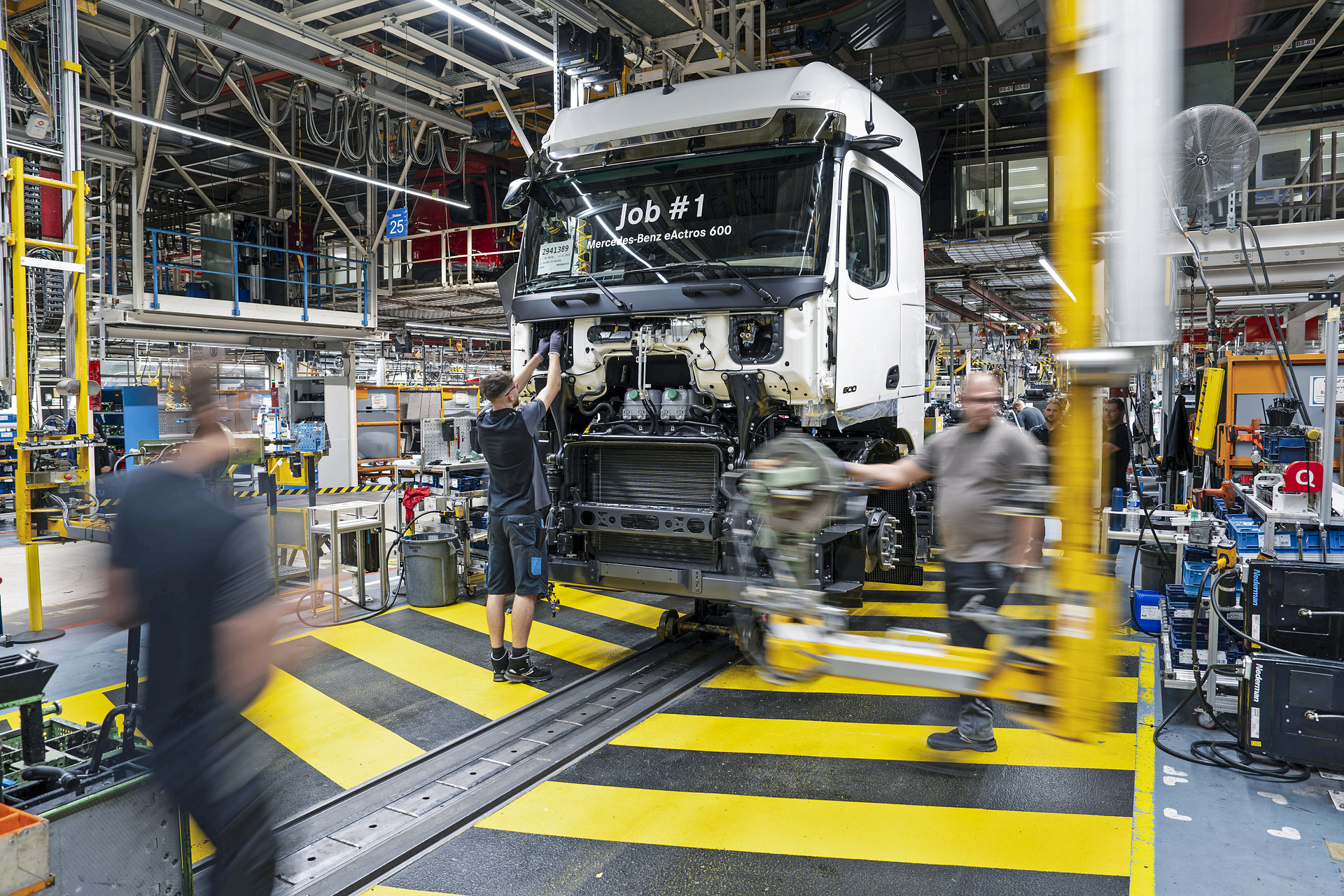
Daimler Truck celebrates series launch of the Mercedes-Benz eActros 600 for long-distance haulage in Wörth

Daimler Truck celebrates series launch of the Mercedes-Benz eActros 600 for long-distance haulage in Wörth

Daimler Truck celebrates series launch of the Mercedes-Benz eActros 600 for long-distance haulage in Wörth

Daimler Truck celebrates series launch of the Mercedes-Benz eActros 600 for long-distance haulage in Wörth

Daimler Truck celebrates series launch of the Mercedes-Benz eActros 600 for long-distance haulage in Wörth

Daimler Truck celebrates series launch of the Mercedes-Benz eActros 600 for long-distance haulage in Wörth

Daimler Truck celebrates series launch of the Mercedes-Benz eActros 600 for long-distance haulage in Wörth

Daimler Truck celebrates series launch of the Mercedes-Benz eActros 600 for long-distance haulage in Wörth

Daimler Truck celebrates series launch of the Mercedes-Benz eActros 600 for long-distance haulage in Wörth

Daimler Truck celebrates series launch of the Mercedes-Benz eActros 600 for long-distance haulage in Wörth

Daimler Truck celebrates series launch of the Mercedes-Benz eActros 600 for long-distance haulage in Wörth

Daimler Truck celebrates series launch of the Mercedes-Benz eActros 600 for long-distance haulage in Wörth

Daimler Truck celebrates series launch of the Mercedes-Benz eActros 600 for long-distance haulage in Wörth

Daimler Truck celebrates series launch of the Mercedes-Benz eActros 600 for long-distance haulage in Wörth

Daimler Truck celebrates series launch of the Mercedes-Benz eActros 600 for long-distance haulage in Wörth

Daimler Truck celebrates series launch of the Mercedes-Benz eActros 600 for long-distance haulage in Wörth

Daimler Truck celebrates series launch of the Mercedes-Benz eActros 600 for long-distance haulage in Wörth

Daimler Truck celebrates series launch of the Mercedes-Benz eActros 600 for long-distance haulage in Wörth

Daimler Truck celebrates series launch of the Mercedes-Benz eActros 600 for long-distance haulage in Wörth

Daimler Truck celebrates series launch of the Mercedes-Benz eActros 600 for long-distance haulage in Wörth

Daimler Truck celebrates series launch of the Mercedes-Benz eActros 600 for long-distance haulage in Wörth

Daimler Truck celebrates series launch of the Mercedes-Benz eActros 600 for long-distance haulage in Wörth

Daimler Truck celebrates series launch of the Mercedes-Benz eActros 600 for long-distance haulage in Wörth
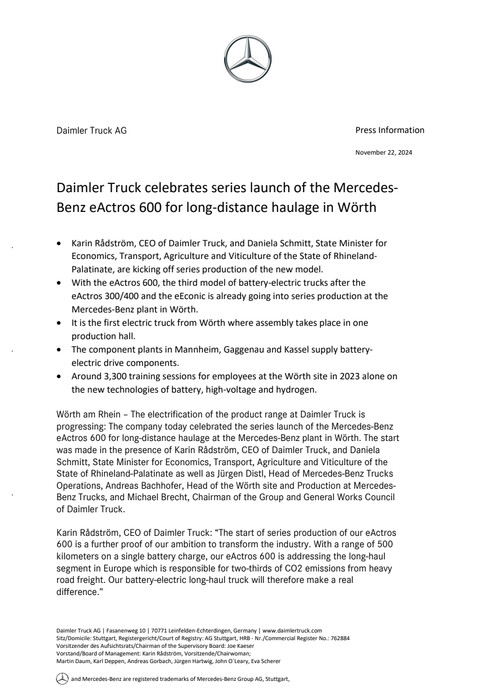
Daimler Truck celebrates series launch of the Mercedes-Benz eActros 600 for long-distance haulage in Wörth
Footage | Mercedes-Benz eActros 600 Start of Production

Daimler Truck celebrates series launch of the Mercedes-Benz eActros 600 for long-distance haulage in Wörth

Daimler Truck celebrates series launch of the Mercedes-Benz eActros 600 for long-distance haulage in Wörth

Daimler Truck celebrates series launch of the Mercedes-Benz eActros 600 for long-distance haulage in Wörth

Daimler Truck celebrates series launch of the Mercedes-Benz eActros 600 for long-distance haulage in Wörth

Daimler Truck celebrates series launch of the Mercedes-Benz eActros 600 for long-distance haulage in Wörth

Daimler Truck celebrates series launch of the Mercedes-Benz eActros 600 for long-distance haulage in Wörth

Daimler Truck celebrates series launch of the Mercedes-Benz eActros 600 for long-distance haulage in Wörth

Daimler Truck celebrates series launch of the Mercedes-Benz eActros 600 for long-distance haulage in Wörth

Daimler Truck celebrates series launch of the Mercedes-Benz eActros 600 for long-distance haulage in Wörth

Annika Pflüger
Spokesperson Mercedes-Benz Trucks Plants Wörth, Aksaray and Molsheim
annika.pflueger@daimlertruck.com
+49 176 30968626

Arnd Minne
Spokesperson Corporate Communications Mercedes-Benz Trucks & Daimler Buses
arnd.minne@daimlertruck.com
+49 176 30912514

Peter Smodej
Head of Communications Product & Corporate Mercedes-Benz Trucks / Daimler Buses
peter.smodej@daimlertruck.com
+49 176 30936446


































